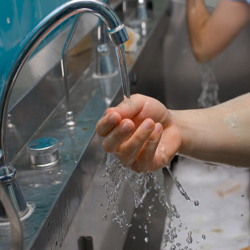Preventing Spread of Infection in Hospital: It is in your Hands

Germs, like virus and bacteria, cause infections. Many of the infections children experience are contagious, such as colds and diarrhea. In hospital, precautionary measures must be taken to limit the spread of infection from one person to another.
Who is at risk for acquiring infections…
How are these infections acquired…
Germs that cause contagious infections are present in secretions (mucus, saliva) or excretions (vomit, stool) of people with the infection. Your hands touching skin or objects contaminated with these body fluids and then touching your mouth, nose, or eyes is the most common way of acquiring these contagious infections.
A word about handwashing…
Most germs are spread with our hands. Infected people touch their noses or mouths, and then touch other people or objects in the environment. The most important, easiest, and least expensive way to reduce the spread of infection is handwashing. Alcohol-based waterless hand rinses are also effective.¸
How can I prevent other people or myself from getting infected…
Wash your hands after wiping your child’s nose, after assisting your child in the toilet, or after changing a diaper. Another way is to prevent the infected child from touching another child, or touching toys or other objects used by other children.
People with colds should wash their hands after blowing their nose and after coughing into a paper tissue or handkerchief. Children old enough to understand, should be taught not to put fingers into their nose, eyes, or mouth. Neither should they put shared objects into their mouth. They should also be encouraged to wipe their nose with tissue paper instead of wiping with their hands, and to discard the used tissue paper into the garbage, then wash their hands.
Be aware, viruses that cause colds and other infections may survive for hours on tissue paper and surfaces of other objects, like toys, doorknobs, sink handles, telephones, etc. Wash frequently touched surfaces, like sink handles, or shared objects, like toys, because they could be contaminated with viruses or other germs. It is important to wash hands before touching your own or your child’s mouth, nose, or eyes (before eating or feeding your child, for example) and to encourage your child to do the same.
What precautionary measures are taken…
Remember, in a hospital environment, germs may be present anywhere. To protect your child and yourself and to prevent transmission of infection, wash your hands or your child’s hands whenever it is indicated. Likewise, hospital staff should wash their hands, or use waterless hand rinse before and after each contact with patients or with objects that had been in contact with patients. Objects shared with other patients should be washed or wiped with an antiseptic, available in most patient areas, before being reused.


